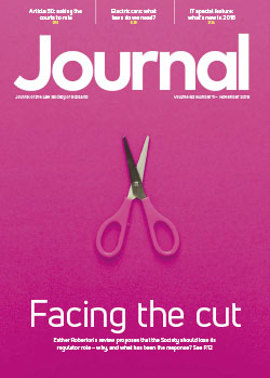Human rights: closing the gap

It’s been 70 years since the Universal Declaration on Human Rights recognised the “inherent dignity and… equal and inalienable rights of all members of the human family”. It’s been 20 years since the Human Rights Act (HRA) came into force in the UK, and the Scotland Act embedded the European Convention on Human Rights into devolution arrangements. And it’s been 10 years since the Scottish Human Rights Commission was established to promote awareness, understanding and respect for rights in Scotland.
As we approach International Human Rights Day on 10 December, when we will celebrate these anniversaries, this is an opportune moment to take stock and consider how Scotland’s human rights laws could be shaped in the future to meet the challenges we face on poverty, inequality and social exclusion. It is even more timely given this month’s visit to Scotland by the United Nations Special Rapporteur on Extreme Poverty, Professor Philip Alston. Professor Alston’s visit and the unprecedented volume of evidence sent to him in advance have focused a spotlight on the daily violations of rights that people living in poverty experience.
Contributing to this agenda, the Scottish Human Rights Commission has this month published a new report, Models of Incorporation and Justiciability for Economic, Social and Cultural Rights, authored by Dr Katie Boyle, Associate Professor of Law at the University of Stirling (pictured). The report provides a comparative analysis of different models of legal incorporation and justiciability of international human rights standards, with a particular focus on economic, social and cultural rights (ESCR).
In recent evidence to Westminster’s Joint Committee on Human Rights, the Commission highlighted the benefits of the HRA, which essentially incorporated the European Convention into domestic law. We drew attention to the HRA’s impact on the development of a human rights culture both in the courtroom and, beyond that, in the design and delivery of policy and services.
It is clear, however, that the HRA and Scotland Act are partial in their protection of human rights. Although they give protection to so-called civil and political rights and freedoms, this does not extend to ESCR, or to other international human rights protections, including newly developing standards.
Achieving recognition
In our work with people across Scotland, the Commission regularly hears evidence that poverty and barriers to accessing health, housing and social security are key concerns in people’s everyday lives. Yet, the international human rights that correspond to these concerns – the rights to an adequate standard of living, housing, food, social security, education and work – have the least bite in our domestic law, and are given the least consideration in practice by public bodies. Dr Boyle’s paper highlights this accountability gap in the implementation and enforcement of ESCR, and other rights contained in international law.
Dr Boyle’s report shows how countries around the world, from Germany and Sweden to South Africa and Argentina, have stronger laws and stronger accountability processes for ESCR than we do here in Scotland.
Around 65 countries globally, including 12 in Europe, explicitly enshrine ESCR in their constitutions. Countries such as Finland also build in parliamentary scrutiny of whether ESCR are being implemented. The report demonstrates the opportunity for Scotland to learn from these systems, building on its existing laws, judicial reasoning, legal remedies and parliamentary processes to protect a broader range of human rights.
This echoes the strong message to Scotland from the chair of the United Nations Committee of Economic, Social & Cultural Rights, Virginia Brás Gomes. Speaking during her visit to Scotland earlier this year, she stated: “There is jurisprudence of many constitutional courts that proves that human rights are universal, indivisible and interdependent and, therefore, justiciable.”
Ms Brás Gomes was clear about the committee’s view that “covenant norms must be recognised in appropriate ways within the domestic legal order, appropriate means of redress or remedies must be available to any aggrieved individual or group, and appropriate means of ensuring governmental accountability must be put in place”.
International comparisons
What stands out from Dr Boyle’s research is that the question is not so much whether there can be legal enforcement of ESCR, but rather how that can be done, taking account of a country’s legal and constitutional culture. This point was also made by James Wolffe QC, prior to his appointment as Lord Advocate, when he stated in 2015 that: “The question of whether the courts should be given that role – or any other role in relation to economic and social rights – seems to me, ultimately, to be a political or constitutional question, not a conceptual one.”
In Germany, for example, a constitutional right to dignity has been interpreted as constituting minimum standards (Existenzminimum) across particular social rights.
The “tutela” device in Colombia enables a person to file a writ of protection before any court or tribunal for the immediate protection of her or his “fundamental constitutional rights”. This has led to profound legal change and the courts granting structural remedies to address a range of issues in housing, health and education.
In South Africa, comprehensive constitutional protection of ESCR has given rise to case law on the protection of housing, healthcare and education. In countries such as Finland and Sweden, the legislature has an obligation to enact rights – protecting legislation and to scrutinise for compliance with ESCR.
Levels of obligation
Any future model of incorporation in Scotland must take account of our specific legal and constitutional context. That context includes devolution, an unwritten constitution, the doctrine of parliamentary sovereignty and the range of existing mechanisms used for the protection and implementation of rights, both in the courts and beyond in the legislature and executive.
Dr Boyle’s paper sets out various “building blocks of justiciability” and the kind of issues to consider when creating a framework for ESCR adjudication. These include issues such as standing, the grounds of review, enforcement and remedy. She argues that the courts are well equipped to adapt to ESCR adjudication, and to develop grounds of review and innovative remedies in order to identify the most appropriate way of determining a case.
The paper also draws an important distinction between process and outcome obligations, or procedural versus substantive enforcement of ESCR. A process obligation may require Parliament or the executive to revisit a process or policy. An outcome-based duty will require Parliament or the executive to revisit an actual outcome for a claimant, meaning substantive change is required.
In Scotland, we have already had some debate about varying levels of obligation and accountability. For example, debates took place in the passage of the Children and Young People (Scotland) Act 2014, resulting in the ultimately weak procedural duty to keep the Convention on the Rights of the Child under consideration. The issue arose again in relation to the newly passed Social Security (Scotland) Act 2018. Ultimately, no ministerial duty to comply with the right to social security was enshrined in the legislation. However, the issue was debated during the legislative process, largely driven by the work of the Commission and a range of civil society organisations.
Courts in dialogue
It is clear that to give people the fullest protection of their rights, courts may be required, in some circumstances, to develop outcome-oriented orders and remedies where the rights have not been realised. At the same time, courts will also need to show deference to the roles of the Parliament and executive. In this way, Dr Boyle describes how the court becomes an intervener in the enforcement of ESCR as an important part of a multi-institutional dialogue between the judiciary, Parliament and executive.
The debate around strengthening accountability for the implementation of international human rights has advanced significantly in Scotland over the last decade. Increasingly, the Scottish Parliament, Government, First Minister and civil society have engaged in constructive dialogue around protecting and implementing ESCR. This has been stimulated by several factors: the ongoing fallout of the global financial crisis; the impact on rights of UK Government austerity and welfare reform policies; the further devolution of powers to Scotland in areas such as social security and taxation; and concerns over the impact of Brexit on rights.
The First Minister’s Advisory Group on Human Rights Leadership will make recommendations later this year on opportunities to improve the protection of economic, social and environmental rights. We hope that Dr Boyle’s research will be an important and practical contribution to the discussions that will follow.
There is a wealth of international experience and practice – in courtrooms and in parliaments – for Scotland to learn from, replicate and build on. The Commission looks forward to working constructively with all relevant institutions to apply that learning, and to strengthen Scotland’s human rights laws to protect people’s rights more fully.
In this issue
- Salaried but not employed
- Brussels and Brexit: the end of the beginning
- The art of rectification
- Affidavits in family actions: the new practice
- Overseas but under the law
- Share schemes: the key to unlocking business success?
- Reading for pleasure
- Opinion: Laura Connor
- Book reviews
- Profile: Waqqas Ashraf
- President's column
- Ayr-Zetland: the tour continues
- People on the move
- Heading for a split?
- Brexit: a role for judicial review
- Human rights: closing the gap
- Switching on to electric cars
- Excellence in many guises
- Legal IT: from potential to progress
- How to get law firm stakeholders to invest in legal technology
- End of the road
- Deficiencies of process v disability discrimination
- Family lawyers and the sleuth client
- Sending the right message
- Pension transfers: protecting people from themselves
- Scottish Solicitors' Discipline Tribunal
- Missives: the third way
- Variety in squeezed times
- Public policy highlights
- New year, new plan
- Mentoring scheme moves up a level
- Ask Ash
- (Re)Setting the clock – the breeze that caused a storm*
- Paralegal pointers
- The quest for innovation
- Appreciation: Murray Alexander Sinclair






